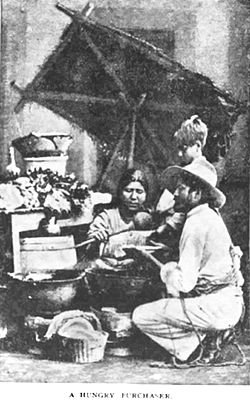On going to the kitchen a little later, I was surprised to see the gentle Jesusita seated in the middle of the floor, by a charcoal fire, with all my pottery vessels in a heap beside her. Meats, vegetables, and water were all at hand, and she was busily engaged in preparations for dinner. I told her to come and see how well she could cook on that American machine, but she only answered, "No es costumbre;" besides, "Don Juan Bautista said it would give her the enfermedad, or sickness, before mentioned—and no man knew more than he"—which meant I should use my own machine.
I called upon Don Juan Bautista to go with me to market, when he at once entered into a lengthy discourse about ladies going to such places; that the jente decente (people of pedigree) never did such things; that "the people in the streets and markets would talk much and say many things." But of this I had already had a foretaste.

I was about to lead the way through the big door, when Jesusita came forward and laid her soft hand upon me, saying: "Señora, do not go; Juan knows better than you about such business. In this country ladies like you send the mozo." But I was proof against her persuasive eloquence. To surrender my entire nationality and individuality was not possible for a good American.
The pair talked aside in low undertone, which I watched with feigned indifference and half-closed eyes. Jesusita glanced commiseratively at me, as if she had used her best efforts to no purpose;
